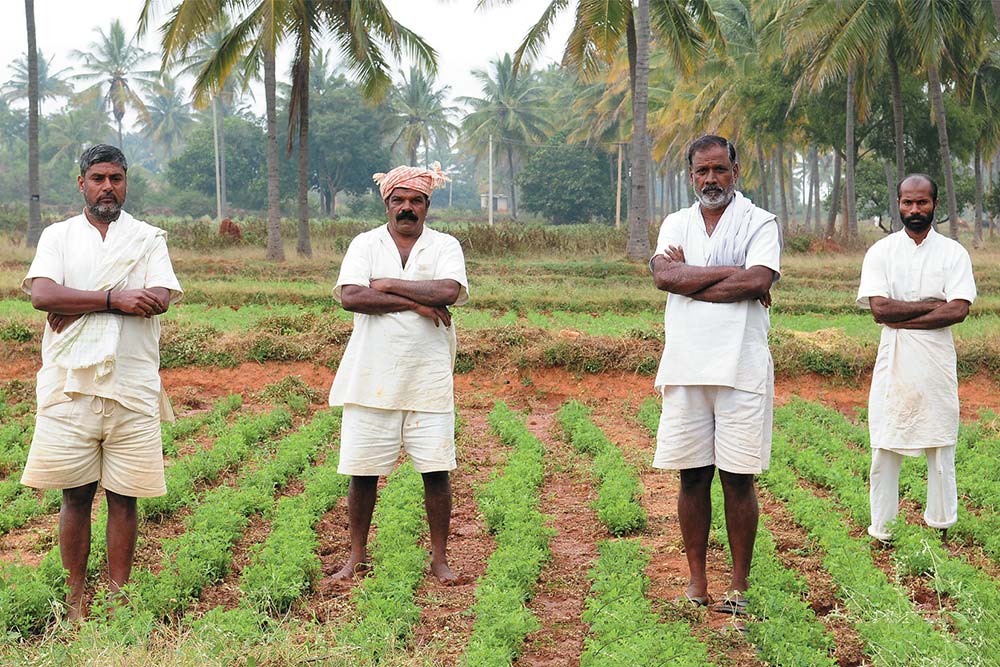Putta Raju, a 49-year-old from Hassan in Karnataka, was serving a life sentence at the Bangalore Central Jail. Twelve years into his term, Raju’s good conduct earned him a move to the ‘open jail’ (where convicts are not kept behind bars), where 55 prisoners like him cultivate rice, vegetables, fruits and medicinal plants. Raju earns up to ₹4,000 a month.
The prison project is a part of Bangalore-based Himalaya Drug’s backward integration programme. While the land belongs to the jail and the produce is sold in the open market, Himalaya provides seeds and training to batches of 10-12 prisoners at a time who grow herbs on a 3-acre stretch. It also picks up their produce at the market price and supports convicts who cultivate medicinal herbs after release.
“Now that Himalaya is offering an income of ₹50,000 a year for every acre of land, I will be happy to grow medicinal plants after I am released,” says T Swamy, another convict serving a life-term, while offering us tender coconut with a grin. Swamy’s family grows sugarcane, paddy and vegetables on a 3-acre plot in Mysore, which fetches them ₹3,000 a month.
The ₹1,200-crore Ayurvedic health-and-personal-care products enterprise has been working on this initiative for the last six months. Himalaya is likely to start a similar project in jails across Andhra Pradesh. The company has already sourced close to 200 quintals of alfa-alfa (a key ingredient of its flagship formulation Liv-52 for animals) from the open jail in Bangalore.
Apart from the prisoners, 4,000 independent contract farmers and five NGOs receive Himalaya’s support to grow and sell medicinal herbs to the company. Forty-year-old Shiva Kumar, for instance, has been growing medicinal plants such as tulsi and alfa-alfa on his 3.5-acre plot in Tumkur, Karnataka, since 2001. “The returns are assured and there is no middleman involved,” says Kumar, who was earlier growing jowar. In the last 10 years, he has sold more than 2.5 tonnes of medicinal herbs to Himalaya.
Himalaya is also partnering with a dozen NGOs who work with poor farmers along the same lines. For instance, the Madurai-based Foundation for Revitalisation of Local Health Traditions, which runs a for-profit farmer organisation called Gram Mooligai (GMCL), collaborates with Himalaya to work with nearly 200 farmers in the cultivation of six varieties of herbs. “We have supplied more than 400 metric tonnes of herbs to Himalaya,” says Muthu Velayuthum, MD, GMCL.
In another effort, Himalaya is working with Guwahati-based Aranyak, an NGO involved in conserving wildlife habitat and ecology, to identify eight varieties of endangered medicinal herbs found in the North East. The next step will be to see whether their cultivation is feasible.
On the face it, all of these are no doubt stellar, socially responsible endeavours, but they are also part of a clear-cut business strategy — Himalaya procures more than 45% of its raw materials via contract farming and has set itself a deadline of increasing that figure to 70% by 2015. Ravi Prasad, executive chairman and CEO, Himalaya Drug, calls them ‘business social-responsibility’ initiatives. “We have made farmers stakeholders in our business so that both of us are committed to each other,” he says. “I find this a far more effective way to run a CSR programme because I feel a corporate will stay committed to a cause only if it’s embedded into its business model.”
Trouble at source
Though Himalaya has been sourcing its Ayurvedic ingredients from local farmers since the 1930s, the company has been extremely serious about backward integration since 2005. It was poor quality that forced Himalaya to rethink its sourcing from the open market. “We had to reject herbs we bought from the open market on numerous occasions,” says Dr Rangesh, head, drug discovery and R&D, citing the example of turmeric and neem cultivated on land heavily contaminated with microbes.
While self-sourcing has not been a cakewalk, additionally, ever since the company started sourcing ingredients on its own in the last six years, its agricultural raw material costs have gone up by as much as 20% (cost of non-agricultural raw materials increased by 5-8% in the same period). “Our costs have gone up but we are assured of good quality and we are also able to support poor farmers across the country,” says Prasad, whalso points to Himalaya’s affordable Ayurveda philosophy since the company’s inception. “We have absorbed the additional costs and have managed to do so only because we are a privately-held company. We run the company on internal accruals so we are free from quarterly presentations.”
Now, Prasad’s aspirations are for something quite ambitious. “I want to see Himalaya products in every household across the world,” he says. “If that happens, the journey will be fulfilled.”











